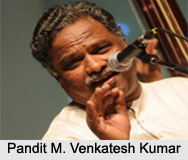 Pandit M. Venkatesh Kumar is an esteemed veteran Indian classical vocalist who is renowned for his dulcet, robust and vibrant singing style and for singing devotional songs. His voice is a rich blend of tradition and devotion, with which he has made a name to reckon with through his many musical performances and vast experience. Most recently in 2016, Pandit Kumar has been conferred the Padma Shri, India"s fourth highest civilian honour by the Government of India, for his contribution in the field of folk art.
Pandit M. Venkatesh Kumar is an esteemed veteran Indian classical vocalist who is renowned for his dulcet, robust and vibrant singing style and for singing devotional songs. His voice is a rich blend of tradition and devotion, with which he has made a name to reckon with through his many musical performances and vast experience. Most recently in 2016, Pandit Kumar has been conferred the Padma Shri, India"s fourth highest civilian honour by the Government of India, for his contribution in the field of folk art.
Early Life and Training of M. Venkatesh Kumar
Pandit M. Venkatesh Kumar was born on July 1, 1953, in Lakshmipura in the Dharwad region of northern Karnataka. His father late Huleppa was a folk singer leather puppet artiste. At the age of 12, Kumar was taken to Veereshwara Punyashrama in Gadag, central Karnataka, by his uncle Sri Belagallu Veeranna. The ashram was run by religious saint and Hindustani musician Puttaraja Gawai, a revered household name in those parts, under whose close guidance, Kumar received intensive in-house training for 12 years. Kumar was trained at Hindustani vocal in the Gwalior and Kirana "gharana" styles, which he seamlessly blends in his presentations, though he admits to influences beyond these gharanas, chief among them being Ustad Bade Ghulam Ali Khan of the Patiala school. His guru was also trained in Carnatic music, as a result of which there are traces of Carnatic elements, especially in his "sargam" patterns of his music.
Career of M. Venkatesh Kumar
Pandit M. Venkatesh Kumar got his first break in the year 1993, 14 years after leaving the ashram. He received an invitation from the great Pandit Bhimsen Joshi, to perform at the Sawai Gandharva Sangeet Mahotsav in Pune that year. He had established a significant local reputation by then, but the performance in Sawai was the first step to national exposure. However, almost after another ten years he became a regular on the national festival circuit and has featured in many national musical programmes. He has been an "A" grade artiste of the All India Radio since 1988.
In 2002, when the Maharashtra government was conferring the Maharashtra Bhushan award to Pandit Bhimsen Joshi, Joshi was asked whom he would like to hear on the occasion. His first choice was Ustad Rashid Khan, but when told that Khan was unavailable, he did not hesitate in naming Pt. Venkatesh Kumar as his choice.
Pt. M. Venkatesh Kumar has a husky, mellifluous and vibrant voice, rich in tradition and deep in devotion. His illustrious experience and deep-rooted commitment has made him a name to reckon with. He has performed at all the major music festivals in India as well as abroad.
Pandit Kumar has also been acclaimed in devotional music, most for his Kannada Vachana and Dasara Pada singing. He has multiple devotional and classical music albums to his credit.
Pandit M. Venkatesh Kumar also holds a teaching job at the University College of Music, Dharwad in Karnataka. This commitment regularly forces him to turn down concerts, as he refuses to quit the job that offered him stability at a time when concerts were hard to come by. Every morning, the maestro can be seen on his journey from his home to the campus, a journey he still makes on his scooter. He has also received a post graduate degree in music from Gandharva Mahavidyalaya. He has authored the text book of Music prescribed for the Examination conducted by the Government of Karnataka.
Awards and Honours received by M. Venkatesh Kumar
Pandit M. Venkatesh Kumar has been recognised with the following titles and honours.
•Swarashree
•Sangeet Sudhakara
•Sangeeta Ratna
•Karnataka Rajyotsava Award, 1999
•Karnataka Sangeet Natya Academy Award, 2007
•Vatsala Bhimsen Joshi Award, 2009
•Kendra Sangeet Nataka Akademi Award, 2012
•Honorary Doctorate from the Karnataka University, Dharwad, in 2014
•Swara Laya Samrat, 2014
•Padma Shri by the Government of India in 2016




















